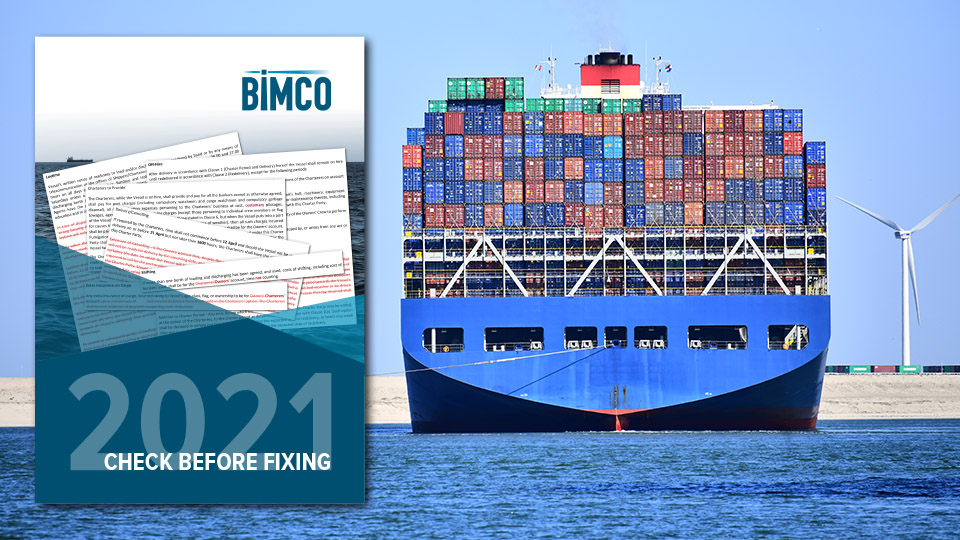Canadian Advance Cargo Notification Clause for Liner Bills of Lading 2015
Overview
Canadian Advance Cargo Notification Clause for Liner Bills of Lading 2015
BIMCO Canadian Advance Cargo Notification Clause for Liner Bills of Lading 2015
(a) As between the Carrier and the Shipper, the Carrier shall be deemed to be the Conveyance Operating Carrier for the purposes of the Canada Customs Act and any relevant regulations, memorandums or notices issued by the Canada Border Services Agency (“CBSA”).
(b) Subject to sub-clause (c) below, the Carrier will be responsible for obtaining a Marine Carrier Code (Bonded or Non-Bonded) as may be required and for providing the CBSA with the Advance Commercial Information by Electronic Data Interchange or otherwise on a timely basis.
(c) The Shipper shall provide the Carrier with all information necessary for the timely and accurate submission of Advance Commercial Information to the CBSA.
(d) Each party shall indemnify the other party for any and all fines, penalties, expenses, loss, damage, delay or any other claim, including attorney’s fees, arising from its failure to comply with this clause.
(e) For the avoidance of doubt, nothing contained in this clause is intended to vary any other provision of this bill of lading as to responsibility for cargo and identity of carrier.
Explanatory notes
Clauses for voyage and time charter parties, originally developed in 2004 in response to US Customs’ requirements for the advance submission of cargo manifest information, were reissued in 2010 to reflect the introduction of parallel arrangements in Canada.
However, further changes have now been made in Canada. New regulatory procedures set out requirements for the designation of a “Conveyance Operating Carrier” as the party responsible for obtaining a Marine Carrier Code and providing the Canada Border Services Agency (CBSA) with commercial information in appropriate electronic format and on a timely basis. The Conveyance Operating Carrier is defined as the party having control of the vessel’s employment and will, therefore, normally be the owner or time charterer.
The Marine Carrier Code can be either bonded or non-bonded. A bond is required whenever unreleased goods move beyond the first port of arrival in Canada. However, the rules for determining the first port of call are complex and putting into port in an emergency or other unplanned first call will require a bonded code. Carriers are therefore strongly recommended to apply for a bonded code in order to cover all contingencies and avoid delays in the event of an unforeseen occurrence or changed itinerary. Further information about bonded and non-bonded codes is available on the “marine carrier” section of the CBSA website.
The present North American Clauses combine US and Canadian requirements in one all-embracing provision with applicable differences addressed through alternative procedures set out in the body of the text. While the underlying principles remain the same in both Canada and the USA, there are now distinct procedural differences between the two administrations’ regulatory requirements. Nevertheless, as the concept of a North American Advance Cargo Declaration Clause is already widely accepted and used by market practitioners, a single clause has been maintained for both the voyage charter and time charter party versions. However, the clause has been reformatted into two sub-clauses – the first covering the unchanged regulatory arrangements in the USA and the second setting out the updated procedures in Canada. An additional, and new, clause has been developed for use in bills of lading in liner trades to Canada.
Detailed provisions for requirements in Canada
1. Voyage Charter Parties
Sub-clause (a) provides that the owners shall be the Conveyance Operating Carrier for the purposes of CBSA requirements;
Sub-clause (b) Owners must obtain the appropriate form of Marine Carrier Code, either Bonded (as recommended) or Non-bonded, and must provide CBSA with Advance Cargo Information in the appropriate electronic format and on a timely basis;
Sub-clause (c) Charterers must provide all necessary information to enable owners to comply with their obligations to provide Advance Cargo Information;
Sub-clause (d) is a mutual indemnity in the event of either party’s failure to comply with the provisions of the clause; and
Sub-clause (e) provides that the clause does not vary party rights and obligations, including any identity of carrier provision, in the underlying charter party.
2. Time Charter Parties
Sub-clause (a) provides that the charterers shall be the Conveyance Operating Carrier for the purposes of CBSA requirements;
Sub-clause (b) holds charterers responsible for obtaining the appropriate Bonded or Non-Bonded Carrier Code and for the transmission of information to CBSA;
Sub-clause (c) modifies charterers’ obligations where a vessel calls at any Canadian port other than in accordance with charterers’ orders. In such event, owners must provide charterers with all necessary information so that they may submit Advance Cargo Information to CBSA;
Sub-clause (d) is the standard indemnity; and
Sub-clause (e) provides that the clause does not vary party rights and obligations, including any identity of carrier provision, in the underlying charter party.
3. Liner Bills of Lading
The content is modelled on the Voyage Charter Party Clause but the terms “Carrier” and “Shipper” are used respectively in place of “Owners” and “Charterers”.
Originally published in BIMCO Special Circular No. 8, December 2015 - Revised North American Advance Cargo Declaration Clauses
Related Help & Advice
Create or edit a contract
The one-stop digital shop for all the standard maritime contracts and clauses you’ll ever need.
Latest Related News
-
BIMCO adopts portfolio of four ETS clauses
The shipping industry is facing an increase in new regulations from the International Maritime Organization (IMO) and the European Union (EU) and an increase in the urgency to decarbonise. To support the industry, BIMCO has developed a portfolio of new emission trading scheme (ETS) clauses.
-
BIMCO adopts new CII clause for Voyage Charter Parties
The shipping industry is facing an increase in new regulations from the International Maritime Organization (IMO) and the European Union (EU) and an increase in the urgency to decarbonise. To support the industry, BIMCO has developed a new CII Clause for Voyage Charter Parties. The clause was adopted by BIMCO’s Documentary Committee on 11 October and is the latest addition to BIMCO’s portfolio of carbon clauses.
-
BIMCO’s CII clause adopted
The BIMCO Documentary Committee has adopted a CII Operations Clause for Time Charter Parties which will help the industry commercially navigate the complexities of the new CII regulations from the International Maritime Organization (IMO).
-
Fumigation
BIMCO providing information and guidance relating to fumigation of cargoes that are shipped under the IMSBC Code, the Grain Code and the IMDG Code.
-
BIMCO publishes EEXI Transition Clause ahead of IMO efficiency regulation
New regulation from the International Maritime Organization (IMO), which will require existing ships to reduce carbon emissions, is due to enter into force in just under one year. As compliance will benefit to a large extent from co-operation between shipowners and charterers, BIMCO has developed a new clause to address the changes.
ELSEWHERE ON BIMCO
Holiday calendar
BIMCO's Holiday Calendar covers general holidays in over 150 countries, plus local holidays and working hours in more than 680 ports around the world.
Learn about your cargo
For general guidance and information on cargo-related queries.




